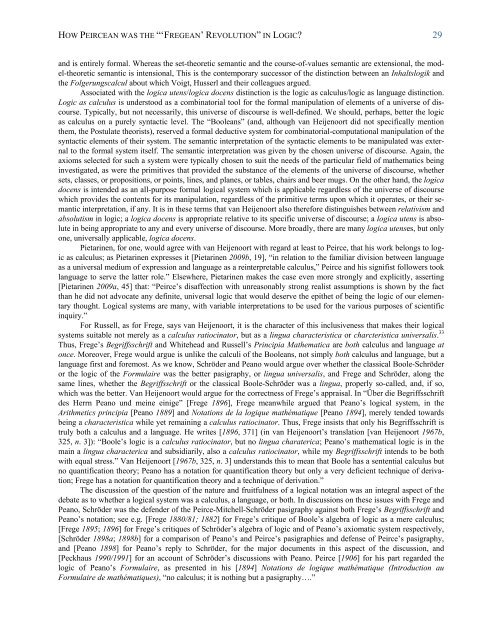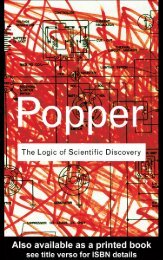Create successful ePaper yourself
Turn your PDF publications into a flip-book with our unique Google optimized e-Paper software.
HOW PEIRCEAN WAS THE “‘FREGEAN’ REVOLUTION” IN LOGIC? 29<br />
and is entirely formal. Whereas the set-theoretic semantic and the course-of-values semantic are extensional, the model-theoretic<br />
semantic is intensional, This is the contemporary successor of the distinction between an Inhaltslogik and<br />
the Folgerungscalcul about which Voigt, Husserl and their colleagues argued.<br />
Associated with the logica utens/logica docens distinction is the logic as calculus/logic as language distinction.<br />
Logic as calculus is understood as a combinatorial tool for the formal manipulation of elements of a universe of discourse.<br />
Typically, but not necessarily, this universe of discourse is well-defined. We should, perhaps, better the logic<br />
as calculus on a purely syntactic level. The “Booleans” (and, although van Heijenoort did not specifically mention<br />
them, the Postulate theorists), reserved a formal deductive system for combinatorial-computational manipulation of the<br />
syntactic elements of their system. The semantic interpretation of the syntactic elements to be manipulated was external<br />
to the formal system itself. The semantic interpretation was given by the chosen universe of discourse. Again, the<br />
axioms selected for such a system were typically chosen to suit the needs of the particular field of mathematics being<br />
investigated, as were the primitives that provided the substance of the elements of the universe of discourse, whether<br />
sets, classes, or propositions, or points, lines, and planes, or tables, chairs and beer mugs. On the other hand, the logica<br />
docens is intended as an all-purpose formal logical system which is applicable regardless of the universe of discourse<br />
which provides the contents for its manipulation, regardless of the primitive terms upon which it operates, or their semantic<br />
interpretation, if any. It is in these terms that van Heijenoort also therefore distinguishes between relativism and<br />
absolutism in logic; a logica docens is appropriate relative to its specific universe of discourse; a logica utens is absolute<br />
in being appropriate to any and every universe of discourse. More broadly, there are many logica utenses, but only<br />
one, universally applicable, logica docens.<br />
Pietarinen, for one, would agree with van Heijenoort with regard at least to Peirce, that his work belongs to logic<br />
as calculus; as Pietarinen expresses it [Pietarinen 2009b, 19], “in relation to the familiar division between language<br />
as a universal medium of expression and language as a reinterpretable calculus,” Peirce and his signifist followers took<br />
language to serve the latter role.” Elsewhere, Pietarinen makes the case even more strongly and explicitly, asserting<br />
[Pietarinen 2009a, 45] that: “Peirce’s disaffection with unreasonably strong realist assumptions is shown by the fact<br />
than he did not advocate any definite, universal logic that would deserve the epithet of being the logic of our elementary<br />
thought. Logical systems are many, with variable interpretations to be used for the various purposes of scientific<br />
inquiry.”<br />
For Russell, as for Frege, says van Heijenoort, it is the character of this inclusiveness that makes their logical<br />
systems suitable not merely as a calculus ratiocinator, but as a lingua characteristica or charcteristica universalis. 33<br />
Thus, Frege’s Begriffsschrift and Whitehead and Russell’s Principia Mathematica are both calculus and language at<br />
once. Moreover, Frege would argue is unlike the calculi of the Booleans, not simply both calculus and language, but a<br />
language first and foremost. As we know, Schröder and Peano would argue over whether the classical Boole-Schröder<br />
or the logic of the Formulaire was the better pasigraphy, or lingua universalis, and Frege and Schröder, along the<br />
same lines, whether the Begriffsschrift or the classical Boole-Schröder was a lingua, properly so-called, and, if so,<br />
which was the better. Van Heijenoort would argue for the correctness of Frege’s appraisal. In “Über die Begriffsschrift<br />
des Herrn Peano und meine einige” [Frege 1896], Frege meanwhile argued that Peano’s logical system, in the<br />
Arithmetics principia [Peano 1889] and Notations de la logique mathématique [Peano 1894], merely tended towards<br />
being a characteristica while yet remaining a calculus ratiocinator. Thus, Frege insists that only his Begriffsschrift is<br />
truly both a calculus and a language. He writes [1896, 371] (in van Heijenoort’s translation [van Heijenoort 1967b,<br />
325, n. 3]): “Boole’s logic is a calculus ratiocinator, but no lingua charaterica; Peano’s mathematical logic is in the<br />
main a lingua characterica and subsidiarily, also a calculus ratiocinator, while my Begriffsschrift intends to be both<br />
with equal stress.” Van Heijenoort [1967b, 325, n. 3] understands this to mean that Boole has a sentential calculus but<br />
no quantification theory; Peano has a notation for quantification theory but only a very deficient technique of derivation;<br />
Frege has a notation for quantification theory and a technique of derivation.”<br />
The discussion of the question of the nature and fruitfulness of a logical notation was an integral aspect of the<br />
debate as to whether a logical system was a calculus, a language, or both. In discussions on these issues with Frege and<br />
Peano, Schröder was the defender of the Peirce-Mitchell-Schröder pasigraphy against both Frege’s Begriffsschrift and<br />
Peano’s notation; see e.g. [Frege 1880/81; 1882] for Frege’s critique of Boole’s algebra of logic as a mere calculus;<br />
[Frege 1895; 1896] for Frege’s critiques of Schröder’s algebra of logic and of Peano’s axiomatic system respectively,<br />
[Schröder 1898a; 1898b] for a comparison of Peano’s and Peirce’s pasigraphies and defense of Peirce’s pasigraphy,<br />
and [Peano 1898] for Peano’s reply to Schröder, for the major documents in this aspect of the discussion, and<br />
[Peckhaus 1990/1991] for an account of Schröder’s discussions with Peano. Peirce [1906] for his part regarded the<br />
logic of Peano’s Formulaire, as presented in his [1894] Notations de logique mathématique (Introduction au<br />
Formulaire de mathématiques), “no calculus; it is nothing but a pasigraphy….”





